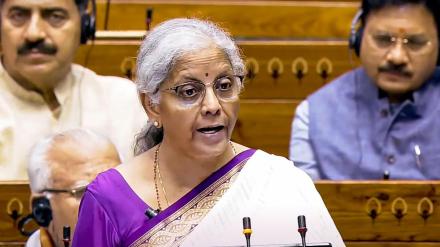Thanks to the amendments added to the Finance Bill 2024 before it was passed by the Lok Sabha on Wednesday, the new regime for taxation of long-term capital gains from property transactions won’t result in any additional burden on the taxpayers, Finance Minister Nirmala Sitharaman said on Wednesday.
The government eased the LTCG tax regime for sale of properties proposed in the Budget 2024-25 by allowing the taxpayer to select between two options – 12.5% without indexation and 20% with it — to lower the outgo, in regard to transfer of properties acquired before July 23, 2024.
Sitharaman also clarified that the rollover benefit will be available to taxpayers who buy new immovable property utilising the capital gains on the sale of old property.
Post the Budget announcement (on July 23), a number of “hypothetical cases” were cited, which depicted an increase in tax-burden for such transactions, said the minister. “The current amendment ensures that even in such hypothetical cases, there will be no additional tax burden,” she said, while adding the government doesn’t intend to gain any additional revenue from capital gains tax rate changes for real estate.
Countering the Opposition’s allegation that the Budget provisions are anti-poor and anti-middle class, the minister said, on the contrary, in the last two-years, “substantial relief” has been brought in for the middle class, with tweaks in the Personal Income Tax slabs, increase in standard deduction, amnesty schemes (Vivad Se Vishwas), interrogation of technology in ITR filing process etc.
On the demand for reduction of central levies on petrol & diesel, the FM while mentioned BJP-ruled states cut VAT, after the Centre announced excise duty cuts in March, the same has not been done by many Opposition-ruled states, such as Maharashtra, Tamil Nadu, and Punjab. However, states point out the fact reduction of central levies automatically result in lower tax revenues for states, as their tax base reduces.
Meanwhile, on the issue of Goods and Services Tax (GST) levy on health insurance premiums, the FM said that the Centre has “not pocketed Rs 24,529 crore” from those levies, as alleged by some quarters. As much as 73-74% of the revenues from the levy are appropriated by the states (by way of 50% direct share in GST proceeds and transfers from the divisible pool of taxes). Sitharaman’s response came days after Union Minister Nitin Gadkari and West Bengal Chief Minister Mamata Banerjee wrote letters to her to remove the levy, and Opposition MPs protesting in Parliament raising a similar demand.
Earlier this week, Minister of State in Finance Ministry Pankaj Chaudhary
Informed the Parliament that GST collection from health insurance premium from FY22 to FY24 was over ₹21,000 crore, while that from health reinsurance premium was around ₹1,500 crore.
The FM said this issue has been discussed thrice in the GST Council, but the GST has still stayed. She also mentioned that even in the pre-GST regime, the health insurance premiums were taxed.
The finance minister mentioned that “small, old, petty, and unverified” (income) tax demands of 9 million taxpayers were removed from the records, from measures announced in the interim Budget. In February, the government had announced that outstanding tax demands up to Rs 25,000 for the period till 2009-10, and Rs 10,000 for the period FY11-FY15 will be withdrawn.
On the new tax regime (NTR), the FM said that as of July 31, in AY25, over 72% taxpayers chose the NTR, which is a drastic increase over the mere 3.8% adoption seen during AY24.
She also said that adoption of NTR doesn’t mean that taxpayers are not investing, or saving. In fact, since 2019, on an average 17.88 new folios in mutual funds have been added every month.
According to the amendment added to the Finance Bill, 2024 , the tax on LTCG from sale of property purchased before July 23, 2024 could either be paid at 12.5% without indexation, or 20% with indexation, whichever is lower. However, new 12.5% tax sans indexation will apply as the only option with regard to capital gains from sale of properties purchased after the cut-off date of July 23, 2024.
In the Budget for FY25, Sitharaman reduced the LTCG tax rate to 12.5% from 20%, for property. But, the benefit of indexation was scrapped for properties that were purchased on or after April 1, 2001. This led to a widespread perception that the post-tax gains from property sales could come down, causing lower demand for real estate units, and fewer transactions.
